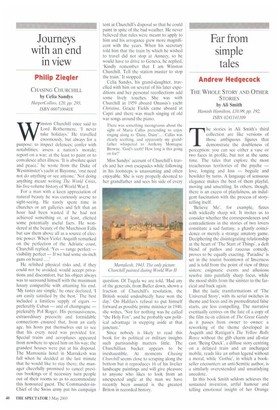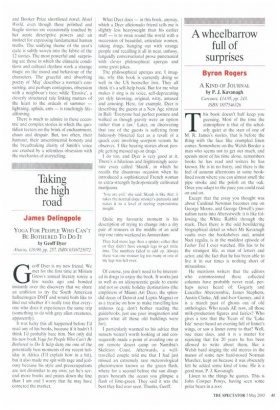Far from simple tales
Andrew Hedgecock
THE WHOLE STORY AND OTHER STORIES by All Smith 1-famish Hamilton, £10.99, pp. 192, ISBN 0241141109 The stories in Ali Smith's third collection are like versions of those ambiguous figures that demonstrate the doubleness of perception: you can see either a vase or two faces in profile, but not at the same time. The tales that explore the most treacherous territories of the psyche — love, longing and loss — beguile and bewilder by turns. A language of sensuous elegance makes the best of them playful, moving and unsettling. In others, though, there is an excess of playfulness, an indulgent fascination with the process of storytelling itself.
'Believe Me', for example, fizzes with wickedly sharp wit. It invites us to consider whether the correspondences and contradictions in the stories of two lovers constitute a sad fantasy, a ghastly coincidence or merely a strange amatory game. Deciphering the disintegrating relationship at the heart of 'The Start of Things', a deft blend of pathos and raucous comedy, proves to be equally exacting. 'Paradise' is set in the tourist boomtown of Inverness and is told from the point of view of three sisters; enigmatic events and allusions resolve into painfully sharp focus, while the mood shifts from the sinister to the farcical and back again.
But the ludic transformations of 'The Universal Story', with its serial switches in theme and focus and its premeditated false starts, are less compelling. The narrative eventually centres on the fate of a copy of the film tie-in edition of The Great Gatsby as it passes from owner to owner: a reworking of the theme developed in Asquith and Rattigan's The Yellow Rolls Royce without the glib charm and all-star east. 'Being Quick', a diffuse story centring on a delayed train and an uncharged mobile, reads like an urban legend without a moral, while 'Gothic', in which a bookseller encounters an anti-Semitic author, is a similarly overextended and unsatisfying anecdote.
In this book Smith seldom achieves the sustained invention, artful humour and telling emotional insight of her Orange and Booker Prize shortlisted novel, Hotel World, even though these polished and fragile stories are occasionally touched by her acute descriptive powers and an instinct for expressing fundamental human truths. The unifying theme of the year's cycle is subtly woven into the fabric of the 12 stories. The most powerful and surprising are those in which the climactic conditions and cultural rhythms work a strange magic on the mood and behaviour of the characters. The graceful and absorbing poetry of 'May' describes a woman's consuming, and perhaps contagious, obsession with a neighbour's tree; while 'Erosive', a cleverly structured tale linking matters of the heart to the ordeals of summer — lightning, aphids, ants — is touchingly lifeaffirming.
There is much to admire in these eccentric and complex stories in which the quotidian teeters on the brink of enchantment, chaos and despair. But, too often, their humour, their unsentimental honesty and the breathtaking clarity of Smith's voice are crushed by a relentless obsession with the mechanics of storytelling.











































































 Previous page
Previous page